Oregon teacher captures images of ‘very rare’ bird never before seen in US
An amateur photographer in Oregon captured a subject last week that has bird lovers chirping — as it’s said to be the first U.S. sighting of this particular species.
Some experts are calling it the “bird of the century.”
“It’s just a very rare thing to have a country-first record in Oregon,” Brodie Cass Talbott, senior educator and trips specialist for the Bird Alliance of Oregon, told Fox News Digital. “It might not happen again for decades.”
RARE WHITE MAGPIE THRILLS MAN IN WALES: ‘WOW, WHAT A THING THAT WAS’
It was Michael Sanchez, a middle school band director from Vancouver, Oregon, who was snapping photos of a waterfall at Hug Point State Recreation Site, just south of Cannon Beach, at sunrise on April 21.
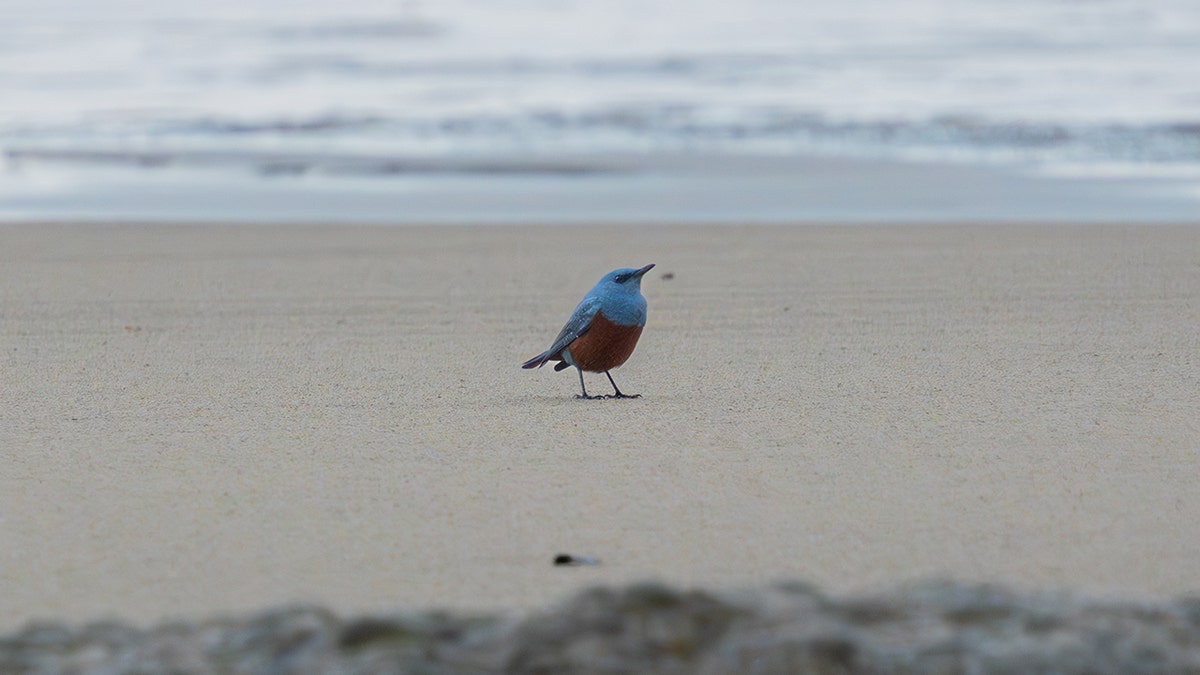
The blue rock thrush is native to Europe and Asia and has apparently never been seen in the U.S. before. (Michael Sanchez Photography)
“I got all the pictures that I could of the waterfall and then I just turned around and happened to see this little black bird,” Sanchez told Fox News Digital, who said he later realized the bird was in fact blue in color.
“I’m a new photographer, so I thought ‘I’ve got to catch anything interesting.’ I snapped some pictures of the bird. It was a really good little model for me.”
The little bird lingered, allowing Sanchez to adjust his camera settings, he said.
RARE GRAY WOLF KILLED DURING HUNT IN MICHIGAN, OFFICIALS LAUNCH INVESTIGATION
“It stayed there on the sand, and it was all by itself,” he said.

Michael Sanchez is a middle school band director who recently picked up the hobby of photography. (Michael Sanchez Photography)
“I got my camera settings all figured out and took some pictures. Then, it flew up to some rocks after about a minute or two. I took some more pictures of it on the rocks and then, after a few moments, it flew away.”
Sanchez said he didn’t think too much of the bird, but after reviewing his photos, noticed that “the little black bird” was actually more colorful than he thought — blue with orange underparts to be exact.
After posting his photos to social media, Sanchez quickly found out he had encountered something quite rare.
ENDANGERED, EGG-LAYING MAMMAL SPOTTED FOR FIRST TIME IN 60 YEARS
“It all kind of took off from there,” he said. “I was excited because what a fun turn of luck for a brand new photographer…seeing this amazingly rare bird. It’s been wild.”
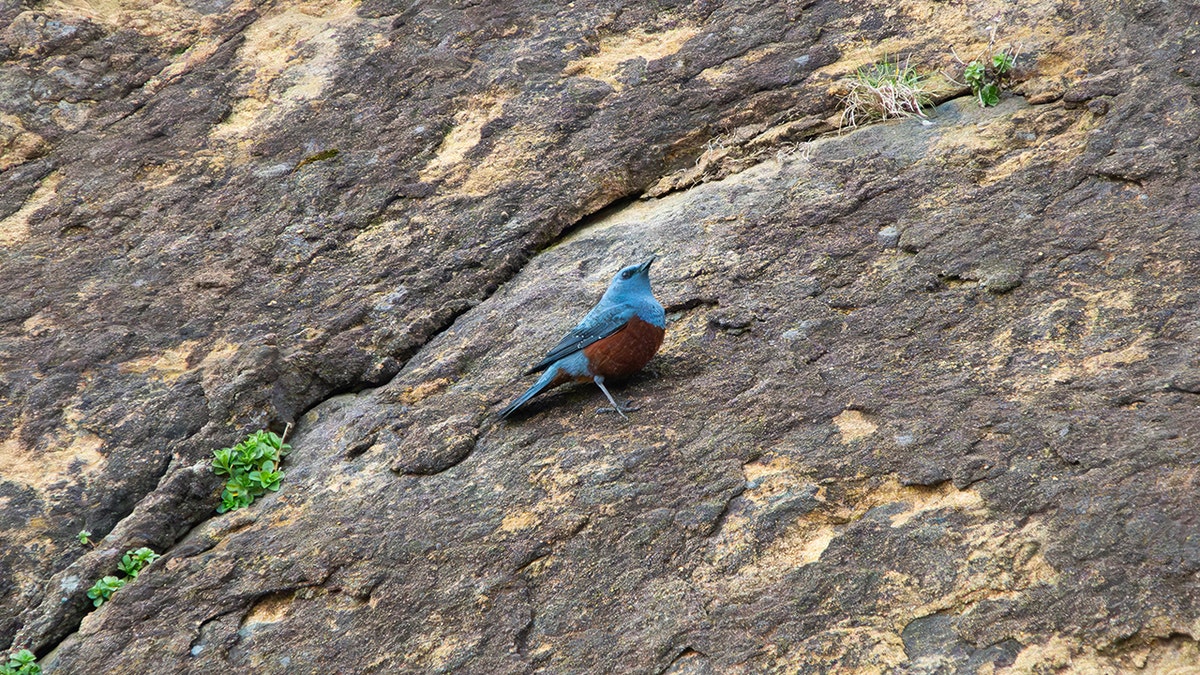
Michael Sanchez, a middle school band teacher in Oregon, has made headlines in the bird community after photographing a rare species that is believed to be seen in the U.S. for the first time. (Michael Sanchez Photography)
Birders from all over the country began reaching out to Sanchez to let him know the significance of his sighting — one of them letting him know that he had photographed “an extraordinarily rare bird, quite possibly the first sighting in the lower 48 states and, one of only two sightings ever on the continent,” Sanchez said.
The bird causing all the commotion: the blue rock thrush, a mostly solitary bird that is native to Europe and Asia.
“It’s exceptionally rare,” Cass Talbott said.
RARE SPECIES OF RODENT CAPTURED ON WEST VIRGINIA TRAIL CAMERA
“It’s about as rare as they come because it’s the first one ever photographed in the United States,” Cass Talbott added.

Brodie Cass Talbott, who works with the Bird Alliance of Oregon, which is a conservation and education organization, said the only other record of this bird being seen in North America was in British Columbia in 1997. (Brodie Cass Talbott)
There’s only one previous record in North America, which was in British Columbia in 1997, according to Cass Talbott.
Cass Talbott said he had the opportunity to observe the species while living in Asia.
“They hang out on the ground a lot,” Cass Talbott said. “You’ll usually see them sitting on a pile of rock somewhere, or a big rocky cliff. They’re cute and sort of plucky and they just hop around a lot and eat a variety of bugs and other stuff.”
RARE ANIMAL’S ARRIVAL WILL HELP REVEAL SECRETS ‘OF ONE OF LEAST-KNOWN SPECIES ON THE PLANET’
How a blue rock thrush may have arrived on the shores of Oregon is unclear, according to Tim Janzen, secretary of the Oregon Birding Records committee, the state organization that certifies bird sightings.

Tim Janzen, secretary of the Oregon Birding Records committee, knows people went out to try and see this amazing sight with their own eyes, but the bird disappeared and no one has seen it since. (Tim Janzen)
“My belief about this particular bird is that it is a vagrant,” Janzen said. “I think it is going to be very likely accepted as a wild bird because it’s not really near a shipping lane or anything else where we could say for sure that it came off of a ship. And even if it did make its way here, at least partly by ship, we’re never going to know that.”
Birder watchers flocked to Hug Point in the days that followed, hoping to catch a glimpse of the blue rock thrush — but to no avail.
“The thing that’s unfortunate about this particular bird is that it didn’t hang around,” Janzen said.
RARE SPOTLESS GIRAFFE BORN AT TENNESSEE ZOO BELIEVED TO BE ONLY ONE IN THE WORLD
He went on, “Michael [Sanchez] took photos of it and then it up and disappeared — and nobody knows where it went.”
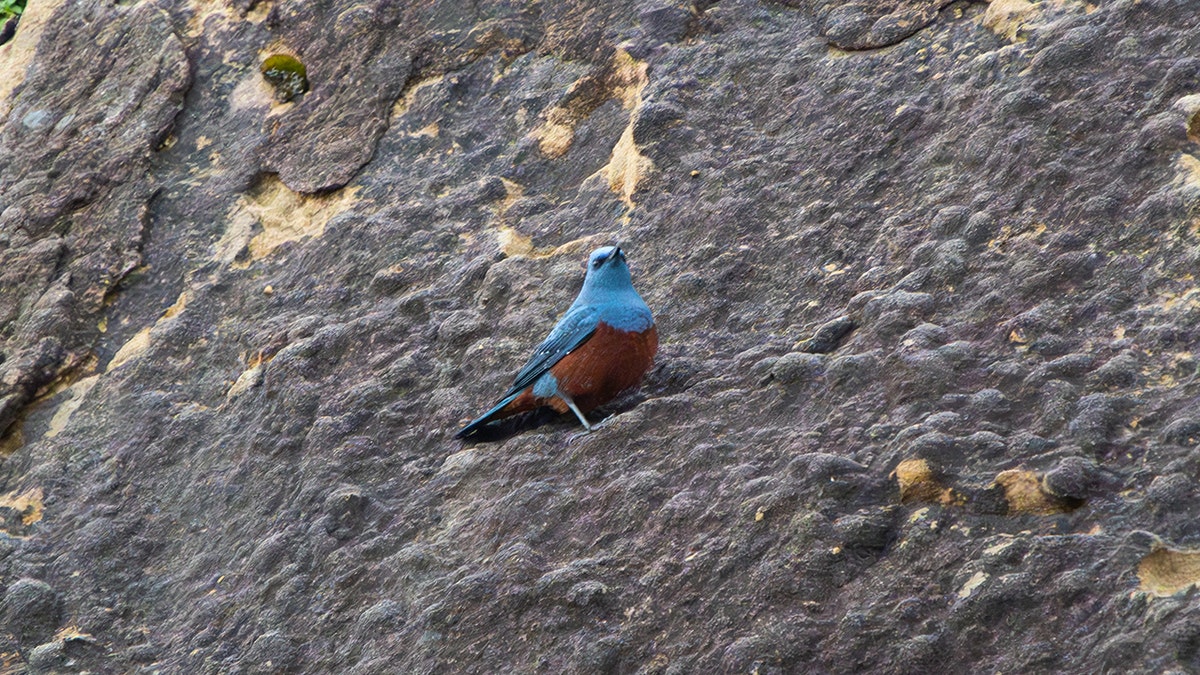
The American Birding Association released a “rare bird alert” a few days after Sanchez’s sighting. (Michael Sanchez Photography)
A few days after Sanchez’s sighting, the American Birding Association issued a “rare bird alert,” reporting that researchers on Southeast Farallon Island in San Francisco, California, photographed what may be a blue rock thrush.
It’s unknown if that bird, spotted around 500 miles from Hug Point, is the same one photographed by Sanchez.
It’s peak migration season currently, Cass Talbott said, and sometimes that could throw birds off-course.
RARE VENOMOUS LIZARDS HATCH AT GEORGIA ZOO AS CONSERVATIONISTS WORK TO SAVE SPECIES
“Most songbirds migrate alone,” he explained. “One potential thought was that it was migrating north, got blown off course by a heavy storm and either got blown so off course that it flew and flew until it landed [in] Oregon, or it got blown out into the ocean, it found a boat, it landed on the boat and it stayed there until the boat got to the west coast of the United States. That seems to be a leading theory.”
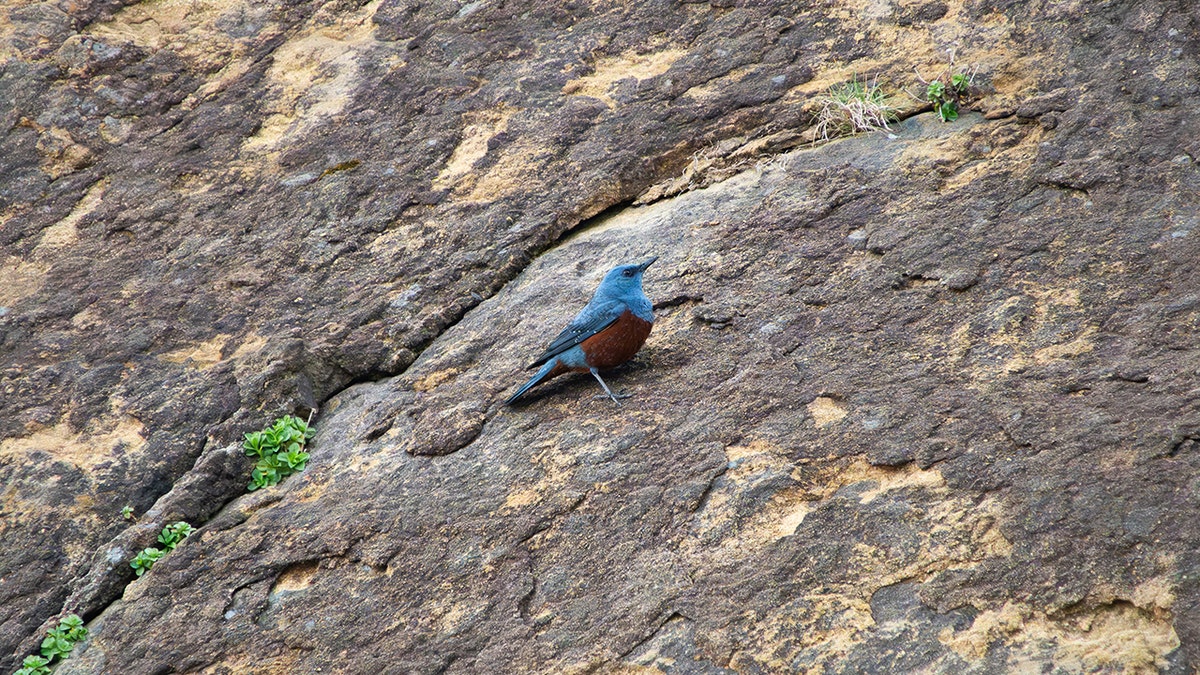
Cass Talbot said that the bird sighting may mean that it stopped by somewhere it’s not supposed to be, before eventually making it back home. (Michael Sanchez Photography)
Cass Talbot said sometimes birds land somewhere they’re not supposed to, and never make it back home. But the public can help, he added.
“We like to remind folks that we can help these birds make sure they do get back to where they’re supposed to be going by doing things like turning out the lights during migration, keeping cats indoors and making windows bird-safe,” Cass Talbot said.
CLICK HERE TO SIGN UP FOR OUR LIFESTYLE NEWSLETTER
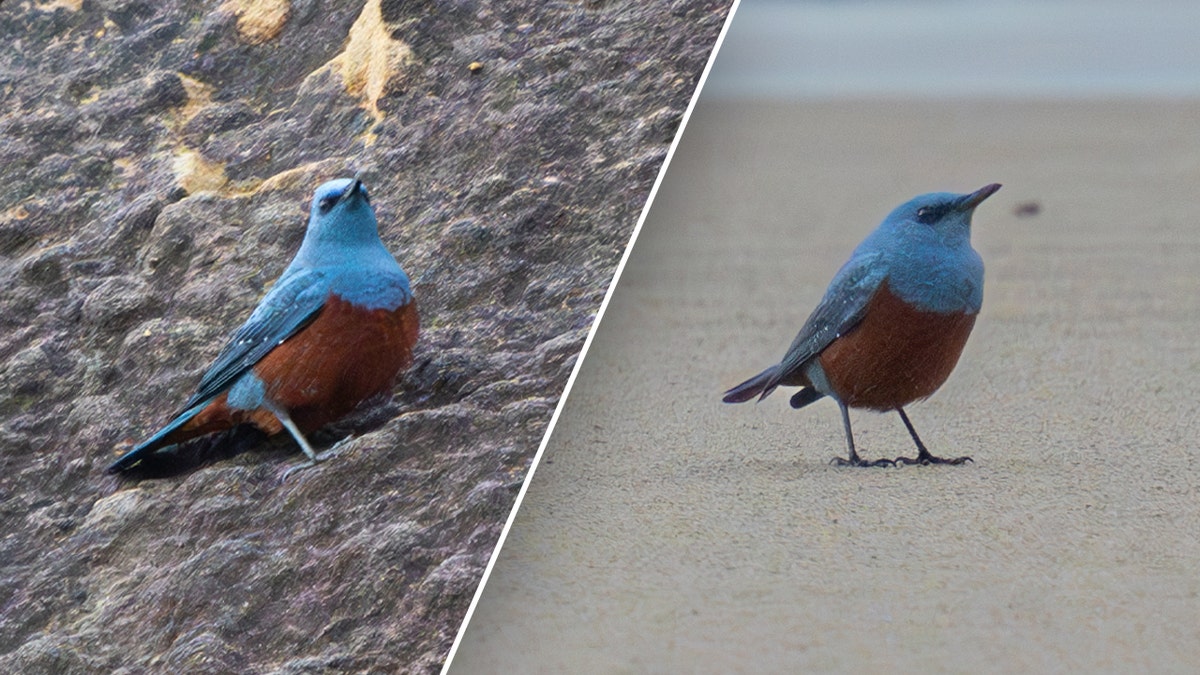
This amazing sighting reminded Sanchez that “beauty can be found everywhere” and people should keep their eyes open. (Michael Sanchez Photography)
Sanchez said his students are excited about his bird photos — and he’s encouraging them to look for beauty all around them.
“I’m a musician, so that’s where my artistic background comes from,” he said.
CLICK HERE TO GET THE FOX NEWS APP
“It might be really hard [in] some places to find it, but there’s nothing wrong with looking for the beauty no matter where you are — and to keep our eyes and hearts open.”
For more Lifestyle articles, visit www.foxnews.com/lifestyle.
